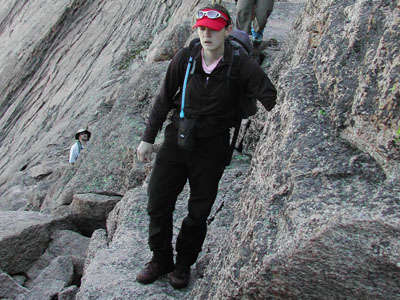| 071 | To Breathe or Not | 2009-04-17 |
OR how to Acclimate or wish you knew how!
As a kid on mountaineering trips into the Wind River Range I remember vividly laying on a rock beside the trail and thinking I was going to die. Actually I was wishing I would die to put me out of my misery. The only problem was, I could not catch my breath. I did not have pneumonia, I had a minor case of altitude sickness.
I am glad that wishes don’t come true. Acclimatization is still difficult for me, but I have learned various techniques that help me avoid mountain sickness.
The funny thing about acclimating is that the sickness has hit me when I have been fit, unfit, and ultra fit. And just to complicate things a little further I have also not been sick when I have been fit, unfit, and ultra fit. So what gives? There seems to be no correlation between altitude sickness and fitness. So don’t let your fitness level talk you into or out of being sick. If you are sick, forget the summit and head downhill.
So what helps me acclimate...
Drink lots of water - it is beneficial to have fluids running through your body. I definitely do not want to be dehydrated, which would thicken my blood and make the cells less efficient at carrying oxygen. I want my blood cells active and happy.
Monitor your heart - oh, not with a gizmo, I mean just paying attention to your breathing. If you are short of breath, try to hyperventilate to restore normalcy. See note at bottom on pressure breathing.
Pace - set a pace, when acclimating, that keeps your breathing in a normal range. Plan easy hikes. If you are short of breath you need to slow down easy on an easy hike. Don’t worry about keeping up with the others in your group, but make sure that they understand why you are slowing your pace.
Medication - I like to take ginkgo biloba as I am preparing to go to the mountains and then aspirin once I am there. I also have found that taking a heartburn pill helps maintain normal acid levels in the stomach. There are no hard scientific data backing my personal prescriptions, they just seems to help me. Caution! Both ginkgo and aspirin are blood thinners, taking them together might make your blood too thin. Caution! Know thy body!
Food - my wife only eats gels in the mountains while she is acclimating. It is the only food that doesn’t upset her stomach. She doesn’t like the gels, instead she turns up her nose and takes them much like medicine! If you get nauseous, you should try her formula. all food you eat should be easy to digest. Why make your body work harder?
Elevation plan - it takes me about four or five days before I can go from sea level to fourteen thousand feet. I start with a hike to about eight thousand foot elevation and then increase the height daily by one to two thousand feet. If I feel bad, I might take a day off, decrease the height, or do an easier hike. The goal on each acclimating hike or climb is to use the time to acclimate to the environment. If I do not reach my hikes destination or goal, it’s nothing to worry about. After I am fit in the mountain air, then I will worry about reaching my goals. If i feel sick, it is time to monitor, change pace and breathing, and then if i am still not breathing well, then turn around and go down. Don’t let others in your group pressure your decision.
And remember, turning green is hardly ever a good sign!
